Despite Rules Revolution in Water Polo, One Constant Remains: Hungary Wins!
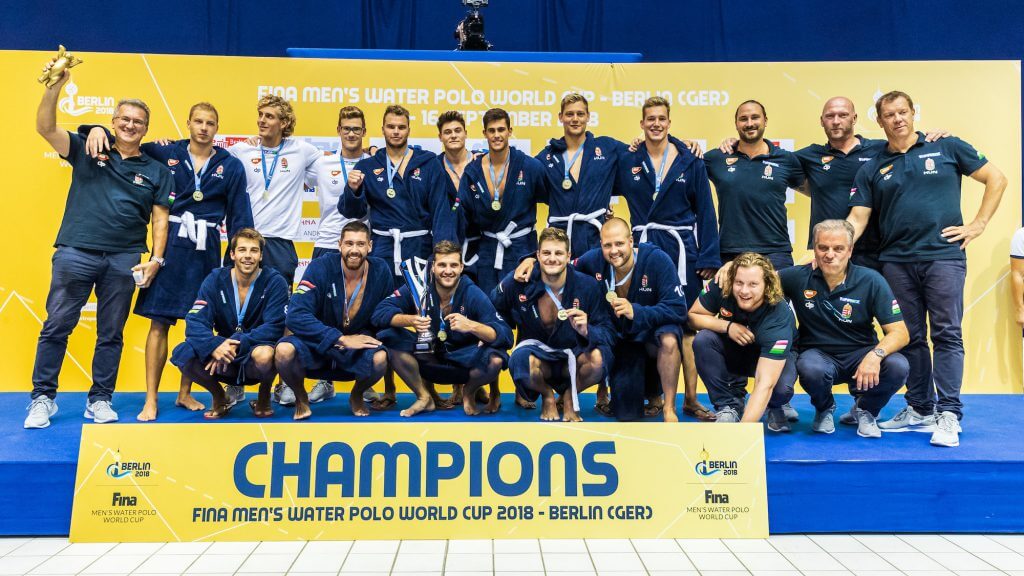
By Michael Randazzo, Swimming World Contributor
BERLIN, Germany. The rules revolution in international water polo claimed its first of hopefully many successes: behemoths Croatia and Serbia did not make the finals of the FINA Men’s Water Polo World Cup 2018, the first time since the 2008 Olympics that has happened in a major international tournament both have appeared in.

Of the major water polo powers participating this week, it was Hungary—very recently the most dominant power in the sport—who claimed the World Cup title with a 10-4 victory over Australia on Sunday at the Europasportpark swimming hall.
Besides the surprising finals absence of Serbia, reigning Olympic title holder, and Croatia, the current World Champions, proposed rule changes being instituted by FINA’s Technical Rules Committee were the hot topic on the pool deck.
By winning decisively, Hungary, with Olympic golds in 2000, 2004 and 2008 and runner-up to Croatia in last year’s World Championship, affirmed both the old and the new world order.
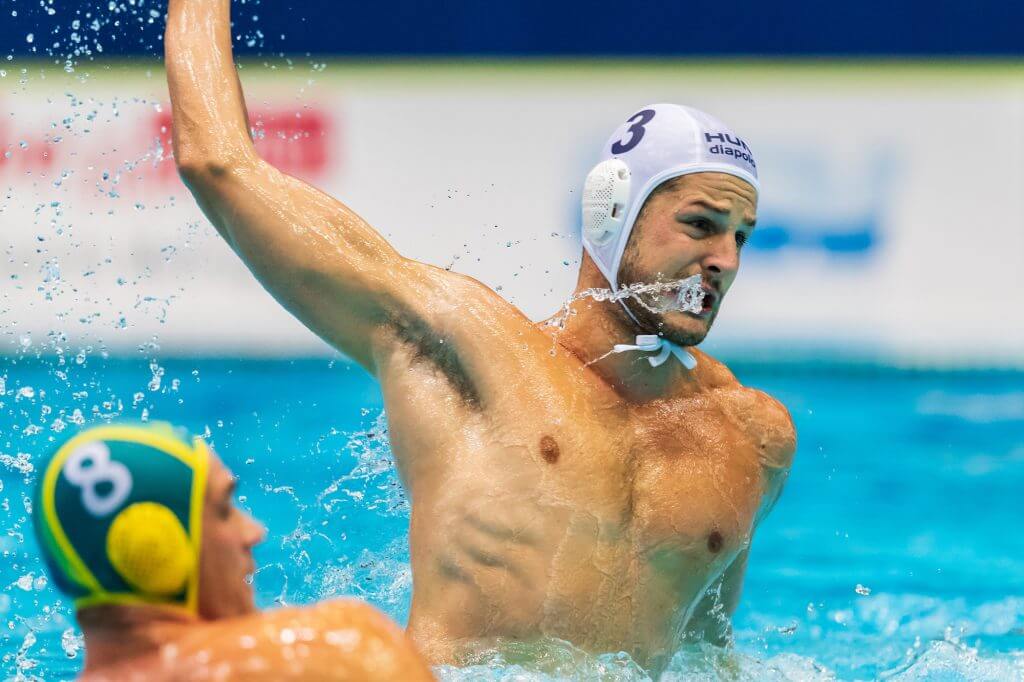
Krisztian Manhercz Photo Courtesy: Sportphoto.shop
Head coach Tamas Marcz was appreciative of the win, a rebound from a disastrous 8th place showing at the 2018 European Championships less than two months ago. Younger players including as Krisztian Manhercz (4 goals) and goalie Gergely Kardos (14 saves) were the difference against Australia, who the Hungarians had beaten just two days earlier.
“It was a really good tournament for us,” Marcz said after the awards ceremony. “We had good motivation and played with some really fresh players—some of them never played in an international tournament. “
After taking down mighty Serbia in Saturday’s semifinal, Marcz pushed back on the idea that this tournament win is the start of a new wave of dominance by his countrymen
“It’s only the first step to demonstrate something from this new Hungary,” he said. “It does not mean Hungary will return to the top and never fall down.
“But we can win if we believe.”
Australia had never before made it to a World Cup Final; in fact, it was the first time in 35 years that they played for gold in any major international tournament. Riding a crest of good feelings, the Aussies had to feel optimistic about their chances of taking home top honors after having dispatched Croatia in the quarterfinals and host Germany yesterday in the semifinals.
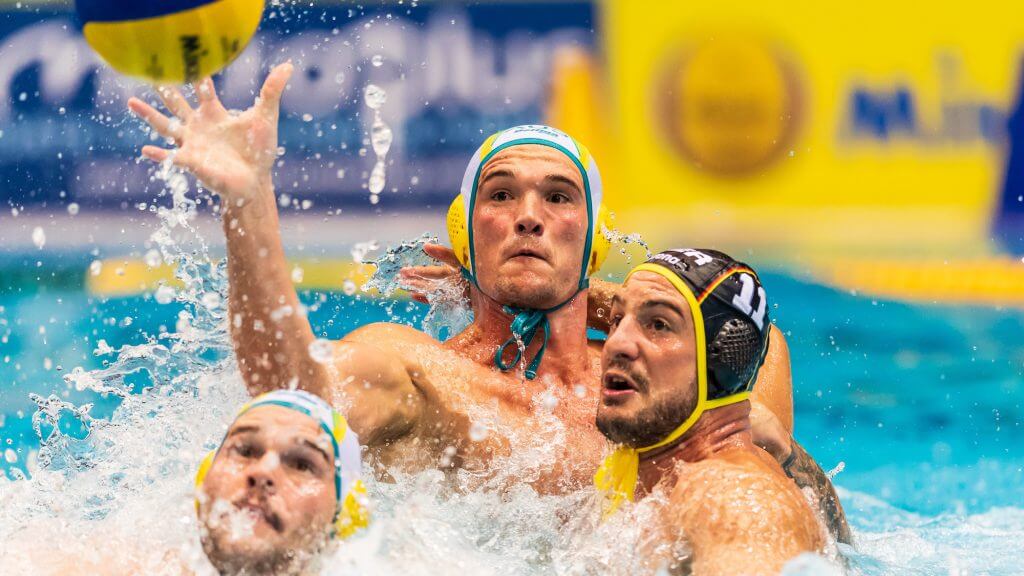
Australia’s Aaron Younger. Photo Courtesy: Sportphoto.shop
“This was a nice week for us,” Australia Head Coach Elvis Fatovic said following the match. “We believed we will finish on a better way than we did today.”
The veteran coach pointed his team’s collapse in the third quarter, when the Hungarians broke the match open on four unanswered goals, turning a 4-2 halftime lead into an 8-2 bulge entering the fourth.
“First, second quarter we were close to them,” he said. “We missed some opportunities. But then in the third quarter we just disappeared. They deserved to win.”
Perhaps the only person not surprised at this unlikely finals pairing was Andrey Kryukov, Bureau Liaison for FINA’s Technical Water Polo Committee and the man charged with changing the rules—and ultimately the future—of international water polo.
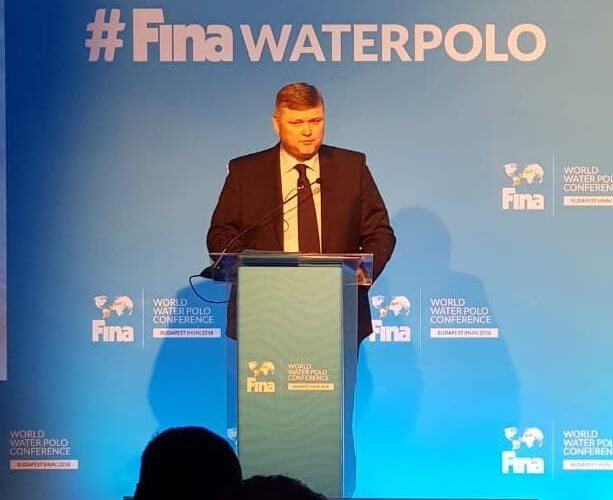
Andrey Kryukov Photo Courtesy: FINA
Kryukov was convinced that the Hungarians prospered in this tournament because they had most quickly embraced the new pace of the matches here, with shorter shot clocks, a push to keep the action—and shots—moving—and a commitment to less physical play. These are hallmarks of the new style of play being advanced by the various rule adjustment, some minor and some major, that were being tested for the first time by senior men at this tournament.
“Hungary adapted very well,” he said while the final match was in progress. “First game [12-10 loss to the Germans; only loss in the tournament] they played old game. They understood. Under new rules [the] old game will not provide any advantage.”
“[The Hungarians] quickly adapted, and as a result they’re in the finals.”
Marcz did not exactly embrace the idea that his and his players’ learning curve was the difference, especially when it came to the first game of the tournament.
“The first game for the delegates, for the referees was a new thing with new rules,” the Hungarian coach said, then added, “We found a way to play in this tournament and were getting better in each match.”
In a backhanded compliment he added: “I like the new rules; not bad, not bad!”
Certainly not for his team.
It could also be that the younger, fresher Hungarian were simply better equipped to withstand the rigors of a six day tournament with only 11 players available on each match date. The average age for Australia, who got lone goals from Andrew Ford, Joe Kayes, Nathan Power and Aaron Younger, was 27. For Hungary, it was 24.
This is was what Fatovic took away from a challenging week of competition.
“After our mistakes they realized a couple of counter-attacks,” he said. “When someone scores that easy way it demoralizes you.
“That was the story in our first game when they were up by 3 – 4 goals and we were able to come back. By the end of the week we were absolutely too tired,” Fatovic added.
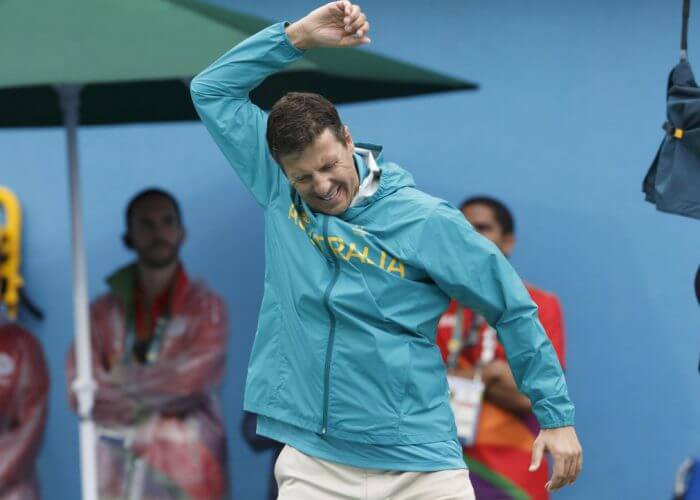
Elvis Fatovic. Photo Courtesy: Waterpology
That fatigue would be on the coaches—and presumably the players’—minds comes as no surprise. One of the major rule proposals, 11-player rosters on game day, with two substitutes available on a team’s extended roster, has already been approved and will be in effect at the 2020 Olympics no matter how teams compete in the lead up to Tokyo.
More to the point was the way that select clubs did, or did not, take advantage of what the changes offered. Kryukov was convinced that the teams who avoided excessive fouling were rewarded with wins. He has a point; after the first game, when the Hungarians had four players foul out and lost, Marcz’s players drew less and less exclusions than their opponents—and won.
But major rule changes and limited rosters does not entirely account for the Hungarian success. Marcz’s players have far more international experience than Australia; and a rebuilt roster mixing established players such as Bence Batori and Tamas Mezei with rising talents like Manhercz, Kardos and Gergo Zalanki (14 goals) can continue the strong showing last year at 2017 FINA Worlds—when they claimed silver in Budapest.
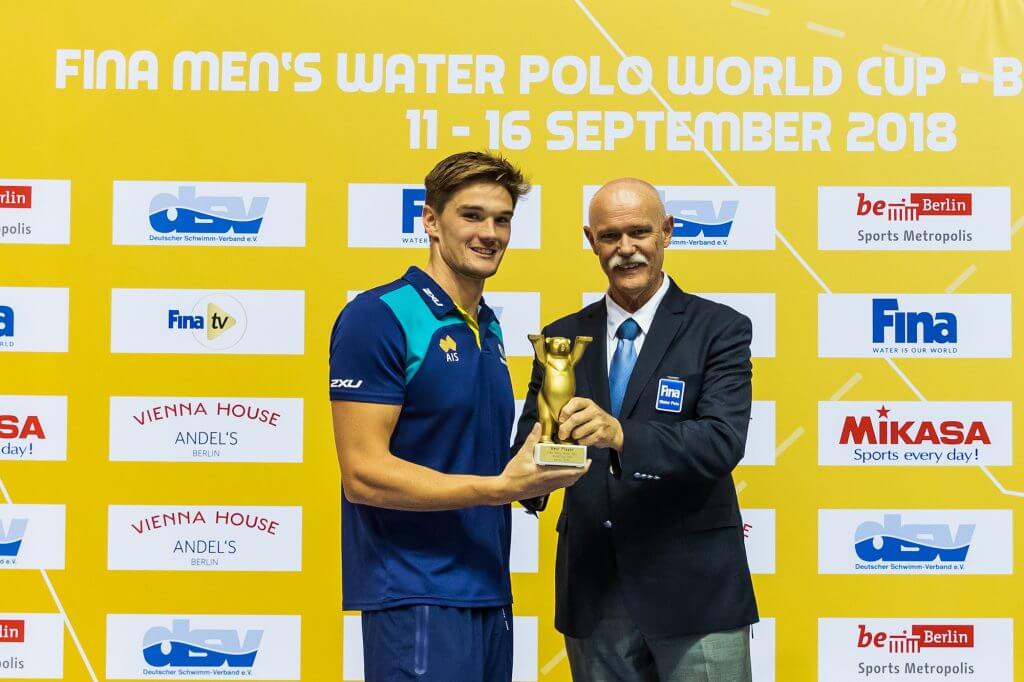
Aaron Younger, Most Valuable Player Photo Courtesy: Sportphoto.shop
It will take some time to verified the impact of the proposed ruled changes, but what is not in dispute is that both Croatia and Serbia, who have greatly prospered using a static, hole set-focused approach to offense where the center is rewarded drawing either an exclusion or a penalty shot, did not enjoy their usual success here in Berlin.
The proof on this is ephemeral, however. It’s certainly possible after a long tournament both Serbia and Croatia, looking to bring new players on line, fell victim to fresher teams and over-eager referees. In the only match that mattered to them, the two teams played to a 10-all tie. Then both suffered a single one-goal loss, Croatia in the quarterfinals to Australia and Serbia in the semifinals to Hungary.
Regardless of the results in Germany, there is much work to do compiling all the data from this tournament, information now readily available to the Technical Water Polo Committee numbers crunchers. And they’d better get busy; the TWPC is meeting in December, and the Olympic Games will be happening before too long.
“Sometimes you know when you are going to win the game, and this is the moment,” said Erik Van Heijningen, a FINA Bureau Member from the Netherlands, then later added: “You are witnessing historical moments.”
Let’s hope he’s right because this moment is critical and time is short.




.png)